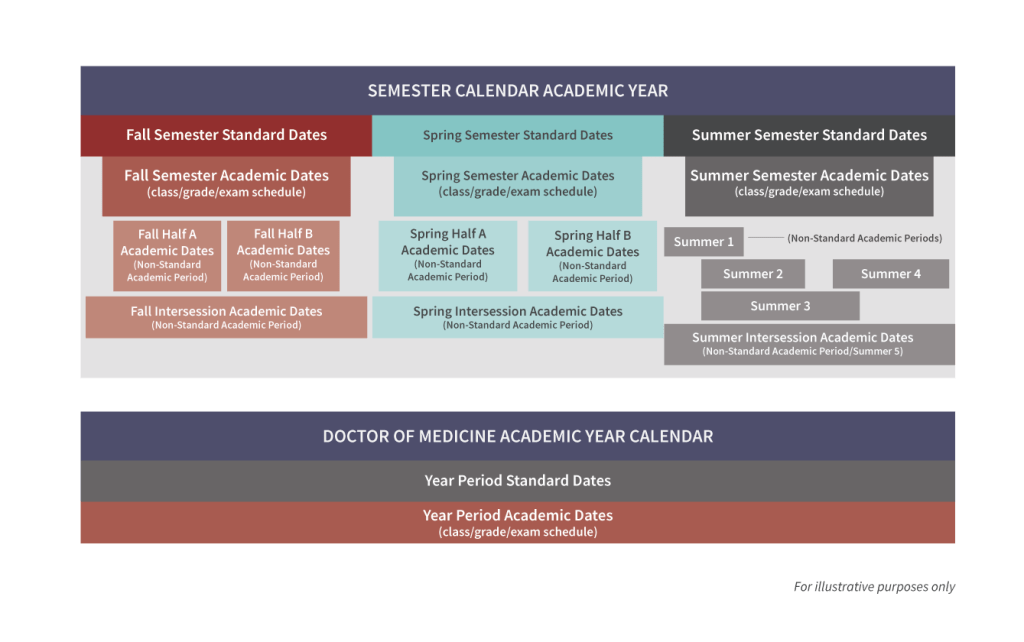Key Idea
The academic calendar provides the time-based framework for Workday Student. It comprises academic years (e.g., 2024-2025) and academic periods (e.g., Fall 2024). Academic calendars are foundational to delivering education and are key drivers behind many faculty, staff and student activities in Workday. WashU will have multiple academic calendars to support our various needs.
Jump To: Academic calendars & periods | Academic calendar policies | Date controls
Overview
Academic calendars provide the time-based framework in Workday and are foundational to delivering education. They are key drivers behind class schedules, registration, academic planning, grading, billing, financial aid, degree conferral, faculty hiring/pay and more. They also are essential for federal and external compliance and reporting, particularly for financial aid and visa issuance.
Academic calendars allow an institution to maintain accurate records and manage date-specific processes. They show up in nearly all student, faculty and staff activities in Workday and can be thought of like a time stamp. For example, students must select an academic period when viewing course sections. Staff use academic periods for processing administrative tasks, such as leaves of absence. Faculty view course rosters and grade students by selecting a specific academic period.
Academic calendars also support reporting to help answer questions like what courses a faculty member taught during a specific academic year, what courses a student was enrolled in during a specific semester, or when a student took a leave of absence.
Academic calendars & periods in Workday
Academic calendars serve as the template for creating academic years* (e.g., 2024-2025), which are made up of academic periods (e.g., Fall 2024). An academic period has defined start and end dates and falls within an academic year.
WashU will use a semester-based calendar, which consists of three academic periods (semesters): Fall, Spring and Summer. Additionally, the School of Medicine’s Doctor of Medicine program will have a separate calendar with a single, yearlong academic period to accommodate its Gateway curriculum.
There are standard and non-standard academic periods. The four standard academic periods that WashU will have in Workday Student are: Fall, Spring, Summer, and Year (for MD’s Gateway curriculum). All other academic periods are non-standard (examples include Fall Half A, Summer 1, Fall Intersession.)
*Today, the term “academic year” is used in a variety of contexts at WashU, including the fiscal year (e.g., AY2024-25) or the more general August to May timeframe. In Workday, WashU will have multiple academic calendars, each with its own academic years, that may or may not align with these examples.

Academic calendar policies
Calendar policies are created and applied to each academic calendar. Academic calendar policies allow us to assign different academic calendars, years and typical attendance patterns to an academic unit/level combination or to a program of study. For example, a calendar policy could be assigned to the “Arts & Sciences undergraduate” combination. It couldn’t be assigned to just the undergraduate level or graduate level or just to Arts & Sciences.
Policy inheritance
All academic units will have an associated academic calendar. Academic calendars may be assigned to one or more academic unit, but an academic unit can only have one academic calendar. Academic calendars may be assigned directly to an academic unit, or an academic unit may inherit a calendar from a superior AU.
Faculty, staff and students will be able to see all academic calendars within Workday, regardless of their academic unit.
Effective dating
Calendar policies are effective dated, which allows WashU to change the academic calendar over time without impacting earlier calendars. For example, if WashU ever moved from a semester calendar to a quarter calendar, the change would be effective dated to preserve data tied to the semester calendar for historical reporting. In fact, WashU is already planning to have data in Workday from historical calendars to enable reporting and transcription based on previous calendars, such as WashU’s trimesters calendar (ended in 2002) or Olin’s Executive MBA full-year calendar (ended in 2009).
Date controls
Date controls indicate when certain milestones, events or deadlines happen during an academic period, such as enrollment windows, last date to drop with a withdrawal (“W”) grade, and final grade assignment. Date controls follow policy inheritance and can be defined for academic period types (e.g., fall semester academic period), specific academic unit/level combinations, or programs of study.
For example, there could be grading deadlines set for all undergraduates for the academic period (e.g., Fall 2023); however, the School of Law (graduate) could set their own grading date controls as their grades are typically due later than WashU’s other schools. Additionally, the Online Law program of study could have separate date controls from the School of Law.
*Last updated 11/14/22.